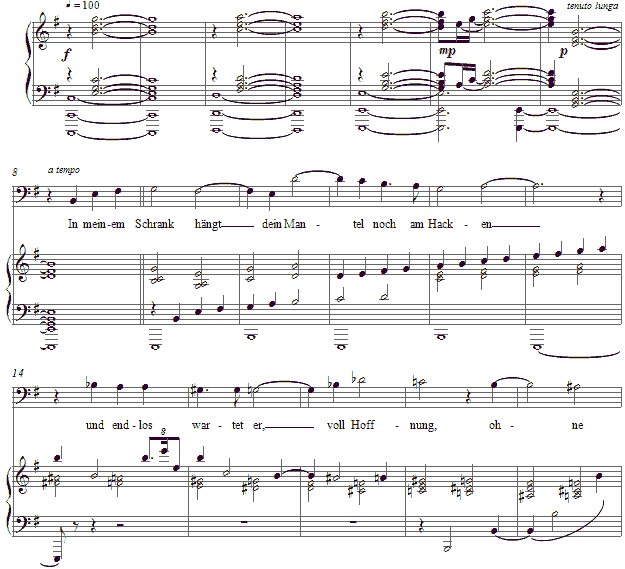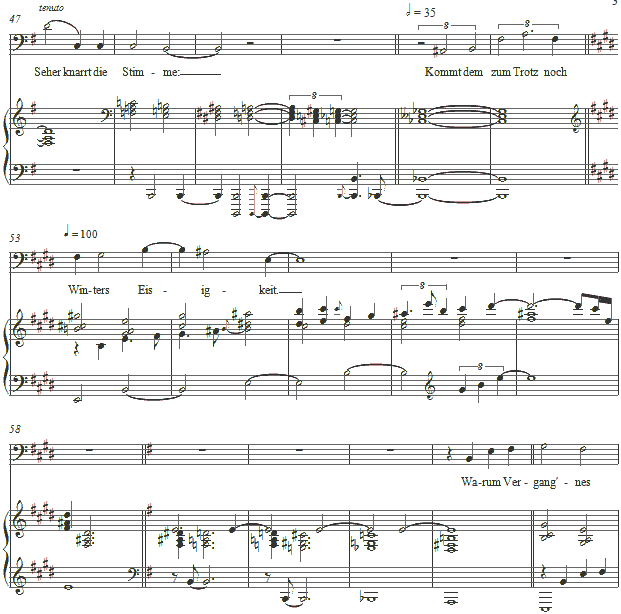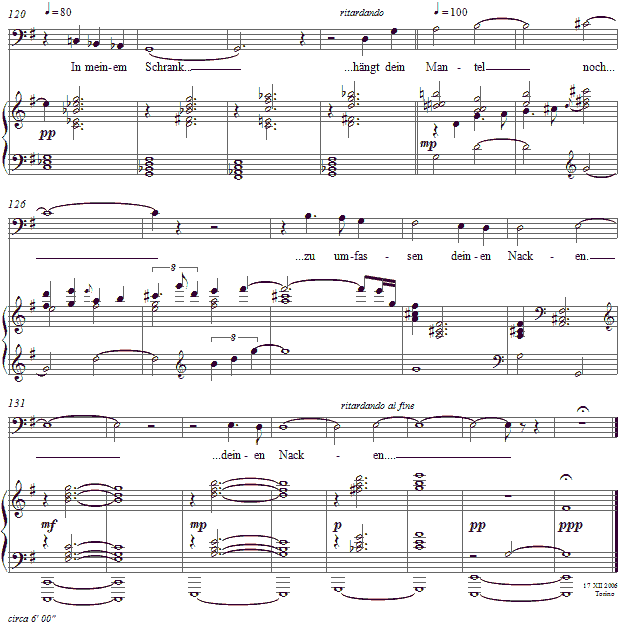Music and Texts of GARY BACHLUND
Vocal Music | Piano | Organ | Chamber Music | Orchestral | Articles and Commentary | Poems and Stories | Miscellany | FAQs
In meinem Schrank - (2006)
Victor Schapìel
for bass or bass-baritone and pianoPavel Kudinov gewidmet
SONETT
In meinem Schrank hängt dein Mantel noch am Hacken
Und endlos wartet er, voll Hoffnung, ohne Harm
Zu treffen dich; er wird es nicht, dich halten warm
Mit Sanftheit zu umfassen deinen Nacken.
Zum Glück weist er mich der Mantel auf die Zeit
Als er mit deinem Hüften haschen spielte...
Doch mir wie einem Seher knarrt die Stimme:
Kommt dem zum Trotz noch Winters Eisigkeit.
Warum Vergang'nes rühren, und Fehler, die versunken?
Bizarr und schlaflos kam der Mantel ins Sonett
Und wirbelt Schnee auf Wien, im Kreise, toll betrunken.
Erinnerungen ich jage fort, die brauche ich nicht, zu spät!
Genügt's mir nicht zu streuen Salz noch in die Wunden;
Dann zeichne ich, deshalb, und wieder dein Porträt.[ 6 pages, 6' 00" ]
Victor Schapìel
Russian-born, Viennese artist Victor Schapìel was bron in Efremov, 200 kilometers from Moscow, 11 November 1941, as he says, "on the day the war front moved through the area. In 1946 the family moved to Leningrad. He recalls, "My teacher was friend and colleague in the Artists Guild of the USSR, which had as members European artists from Cranach to Favorsky." From 1946 to 1979, Schapìel writes "I loved, learned, taught and worked." From 1974-78 he was the chairman of the Leningrad Exlibris- and Graphics Club, and a member of the Guild. In 1979, the family received permission to emigrate to Canada, and thereafter to Austria. Between 1959 and 1983, Schapìel had participated in over two hundred showings, according to his published brochure of that time. [The above wood cut is his self-portrait. ]
The poem is autobiographical, as Schapìel writes of the loss of his wife and her remembrance through the symbol of her coat in this touching poem, recommended to me by Pavel Kudinov. I found the expression exquisitely made, though of course sad.
SONNET
In my closet hangs still your coat on a hanger
and endlessly full of hope and without grief
it awaits to meet you; it will not hold you warm
and with softness gather around your neck.
Thankfully it reminds me that once that coat
had played about your waist...
Yet like a seer creaks a voice:
Now comes disobediently winter's icy cold.
Why stir up the past, and imperfections now buried?
Grotesque and sleepless came the coat into a sonnet
and snow whirls circling about Vienna, drunkenly.
I pursue memories which I do not need, too late!
It is already enough to strew salt on my wounds;
For that I work at it and then comes your image.
The setting opens with large structured chords, representing the clear image and remembrance of the lost love. Thereafter the more mundane melody in regular quarter notes tells of her coat hanging in the closet, personified in having its own awareness and hopeful feeling of her return, never to be. The speaker's telling of this hope is accompanied by falling chromaticism, as the speaker knows of the hopelessness absent in the "coat's" longing.
The appearance of winter is brought by the brighter reference to the parallel E major, but for a moment until the more somber recollections take hold again. When composing to a text, there are dramaturgical considerations to be made, and among them are the "places" which must become tonal regions in order to capture something of the text. Therefore this setting's places are the opening gesture as the lost love, the quarter note progression of a mundane life, the chromatic falling away as loss, and the winter theme representing that which is outside the confines of the sad memory, for winter means winter sports and festive occasions as well for one not mourning.
At the last recollection of the coat which served so well in winter, the theme of winter returns in G major, the relative major of the tonic minor, but only for a moment. I chose to end the setting by recalling some phrases, and end with the intimate image of "your neck," around which the coat had once draped and warmed. Thus does the setting end in its more serious tonic of E minor.
Pavel Kudinov
While working together in Torino, Pavel brought me this text written by his friend in Vienna, another Russian émigré, for my purpose of composing a song for him. Pavel is a fine bass baritone who sang Sarastro in some of our performances. His friend, Victor, had lost his wife to cancer some years back, and this sonnet in part reflects on that experience.
The score is available as a free PDF download, though any major commercial performance or recording of the work is prohibited without prior arrangement with the composer. Click on the graphic below for this piano-vocal score.




